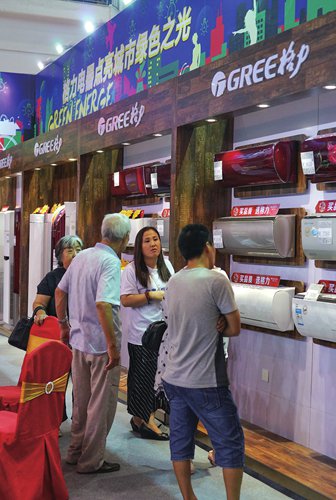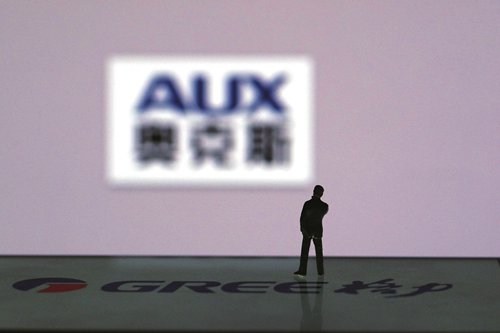HOME >> METRO SHANGHAI,BUSINESS
Clash between Chinese air conditioning rivals heats up
By Deng Zijun Source:Global Times Published: 2019/6/19 18:08:40
Justice or self-interest?
While all Chinese e-commerce players rubbed their hands to make a killing during the annual online shopping bonanza on Tuesday, home appliances giant Zhuhai Gree Electric Appliances Co made an unusual move.
On June 10, Guangdong-based Gree filed a complaint against its long-term rival, Zhejiang-based air conditioner maker Aux Air Conditioner Co, stating that eight of the air conditioners made by Aux failed to meet energy efficiency standards despite claims that Aux made in an advertisement. Most of the models in question were major products that Aux planned to promote vigorously during the shopping gala, which is also peak season for air conditioner sales.
Later that day, Aux countered the claim on its official Sina Weibo account, China's Twitter-like platform, accusing Gree of an unjust competitive act, adding that they will file a lawsuit against the company for damaging Aux's reputation. According to the statement, Gree's air-conditioning market suffered a drop of 11.6 percent in online sales while Aux surged 56 percent in the first quarter of this year.
In fact, this is not the first time the two companies have gone to battle. Over the last decade, Gree has been clashing with Aux over patent disputes, talent poaching, trade secret theft, etc.
Joyce Zeng, a PhD student at the law school of the University of Athens, said that the spat would no doubt promote the health and rapid development of the air conditioning industry. But the core factor is whether Gree's allegation was made based on facts that Aux did mislabel its products. If so, Aux shall be held responsible for deceiving consumers. If not, Gree shall accept the consequences of defamation.
Currently, no results have been announced by the State Administration for Market Regulation, China's top market regulator.

Hidden behind curtains
The peer competition can be found in every industry both in brick-and-motar stores and on e-commerce platforms.
When strolling through Yabaolu Market, a Russian-style fur market in Beijing, you will notice that almost every shop has a door curtain, which may appear to some as a sign of top secrecy.
An anonymous industry insider told the Global Times, "We mainly engage in wholesale businesses with foreign companies. The curtain is an effective way to facilitate negotiations with them, as well as to protect trade secrets. It also keeps peers away from eavesdropping and peeking at our prices and designs."
A few blocks away, the same scene can be spotted in some shops in the famous Silk Market shopping mall. Mr Ding sells men's clothes on the second floor. At first, he hesitated to admit that the curtain is used to prevent peers from peeking inside. But he said that vendors here are not allowed to visit others' shops, so there's no need to worry much about them inquiring about trade secrets.
As for the design, the market also has a strict regulation. "We have a manager on each floor who inspects products every day. If the same design is found in two shops, the one that is determined to be copying will be asked to pull their products off the shelves," Ding said in praise of the regulation. "Nobody wins if the same products are found in every shop. It only offers customers more leverage to bargain."
Su Ya, a lady's footwear designer living in Guangzhou, South China's Guangdong Province, told the Global Times that it's almost impossible to avoid plagiarized designs. "Unlike technological invention, the fast-paced nature of the footwear industry is limited to only a few designs with patents. So, it's an unwritten rule of thumb to imitate notable brands," Su said, sounding a bit dismayed.
"After all, there are just a few trendy designs every year. The key to stand out in this industry is to have a sharp eye and to walk ahead of the trend," Su said.

Online arena
The situation is much more complicated when it comes to competing online. According to Sun Zhongwei, founder and CEO of a Beijing-based visa application agency, there are hundreds of ways to crash a competitor online.
The first thing to note is a negative rating. "When the ranking of a particular product goes up, my competitor might place an order and give a one-star rating and a negative comment after a transaction is completed. The ranking would therefore go down, eventually affecting the sales," Sun said.
"For these attacks, usually we reflect on ourselves first. We go through each step of the service, and check whether we have made an honest mistake that might look offensive to our customer. If not, we would report to the platform and let them make the right call."
Sun introduced that there is another way to bring down the ranking. The conversion rate (the number of sales divided by the number of page visits) is a key factor in deciding whether your product is shown on the top of the page or the bottom. "With sales remaining the same, all they need to do is to create massive visits to a certain product. As a result, the conversion rate plunges, and so do the final sales."
"It's very difficult to take precautions, because you don't know if he is someone from your rival companies or a real customer. In the internet world, the attackers are always in the dark while we are fully exposed," Sun lamented.
However, Sun is not entirely pessimistic. He sees those attacks as opportunities from which he can learn to improve. "By using your opponent like a mirror, you can easily find your own weaknesses," he said.
On June 10, Guangdong-based Gree filed a complaint against its long-term rival, Zhejiang-based air conditioner maker Aux Air Conditioner Co, stating that eight of the air conditioners made by Aux failed to meet energy efficiency standards despite claims that Aux made in an advertisement. Most of the models in question were major products that Aux planned to promote vigorously during the shopping gala, which is also peak season for air conditioner sales.
Later that day, Aux countered the claim on its official Sina Weibo account, China's Twitter-like platform, accusing Gree of an unjust competitive act, adding that they will file a lawsuit against the company for damaging Aux's reputation. According to the statement, Gree's air-conditioning market suffered a drop of 11.6 percent in online sales while Aux surged 56 percent in the first quarter of this year.
In fact, this is not the first time the two companies have gone to battle. Over the last decade, Gree has been clashing with Aux over patent disputes, talent poaching, trade secret theft, etc.
Joyce Zeng, a PhD student at the law school of the University of Athens, said that the spat would no doubt promote the health and rapid development of the air conditioning industry. But the core factor is whether Gree's allegation was made based on facts that Aux did mislabel its products. If so, Aux shall be held responsible for deceiving consumers. If not, Gree shall accept the consequences of defamation.
Currently, no results have been announced by the State Administration for Market Regulation, China's top market regulator.

Customers at an air-conditioning counter in North China's Tianjin Photo: VCG
Hidden behind curtains
The peer competition can be found in every industry both in brick-and-motar stores and on e-commerce platforms.
When strolling through Yabaolu Market, a Russian-style fur market in Beijing, you will notice that almost every shop has a door curtain, which may appear to some as a sign of top secrecy.
An anonymous industry insider told the Global Times, "We mainly engage in wholesale businesses with foreign companies. The curtain is an effective way to facilitate negotiations with them, as well as to protect trade secrets. It also keeps peers away from eavesdropping and peeking at our prices and designs."
A few blocks away, the same scene can be spotted in some shops in the famous Silk Market shopping mall. Mr Ding sells men's clothes on the second floor. At first, he hesitated to admit that the curtain is used to prevent peers from peeking inside. But he said that vendors here are not allowed to visit others' shops, so there's no need to worry much about them inquiring about trade secrets.
As for the design, the market also has a strict regulation. "We have a manager on each floor who inspects products every day. If the same design is found in two shops, the one that is determined to be copying will be asked to pull their products off the shelves," Ding said in praise of the regulation. "Nobody wins if the same products are found in every shop. It only offers customers more leverage to bargain."
Su Ya, a lady's footwear designer living in Guangzhou, South China's Guangdong Province, told the Global Times that it's almost impossible to avoid plagiarized designs. "Unlike technological invention, the fast-paced nature of the footwear industry is limited to only a few designs with patents. So, it's an unwritten rule of thumb to imitate notable brands," Su said, sounding a bit dismayed.
"After all, there are just a few trendy designs every year. The key to stand out in this industry is to have a sharp eye and to walk ahead of the trend," Su said.

Photo: VCG
Online arena
The situation is much more complicated when it comes to competing online. According to Sun Zhongwei, founder and CEO of a Beijing-based visa application agency, there are hundreds of ways to crash a competitor online.
The first thing to note is a negative rating. "When the ranking of a particular product goes up, my competitor might place an order and give a one-star rating and a negative comment after a transaction is completed. The ranking would therefore go down, eventually affecting the sales," Sun said.
"For these attacks, usually we reflect on ourselves first. We go through each step of the service, and check whether we have made an honest mistake that might look offensive to our customer. If not, we would report to the platform and let them make the right call."
Sun introduced that there is another way to bring down the ranking. The conversion rate (the number of sales divided by the number of page visits) is a key factor in deciding whether your product is shown on the top of the page or the bottom. "With sales remaining the same, all they need to do is to create massive visits to a certain product. As a result, the conversion rate plunges, and so do the final sales."
"It's very difficult to take precautions, because you don't know if he is someone from your rival companies or a real customer. In the internet world, the attackers are always in the dark while we are fully exposed," Sun lamented.
However, Sun is not entirely pessimistic. He sees those attacks as opportunities from which he can learn to improve. "By using your opponent like a mirror, you can easily find your own weaknesses," he said.
Posted in: METRO SHANGHAI